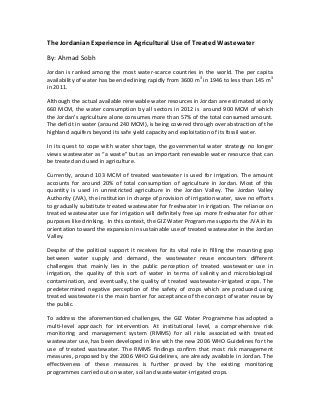
The Jordanian Experience in Agricultural Use of Treated Wastewater
- 1. The Jordanian Experience in Agricultural Use of Treated Wastewater By: Ahmad Sobh Jordan is ranked among the most water-scarce countries in the world. The per capita availability of water has been declining rapidly from 3600 m3 in 1946 to less than 145 m3 in 2011. Although the actual available renewable water resources in Jordan are estimated at only 660 MCM, the water consumption by all sectors in 2012 is around 900 MCM of which the Jordan’s agriculture alone consumes more than 57% of the total consumed amount. The deficit in water (around 240 MCM), is being covered through over abstraction of the highland aquifers beyond its safe yield capacity and exploitation of its fossil water. In its quest to cope with water shortage, the governmental water strategy no longer views wastewater as “a waste” but as an important renewable water resource that can be treated and used in agriculture. Currently, around 103 MCM of treated wastewater is used for irrigation. The amount accounts for around 20% of total consumption of agriculture in Jordan. Most of this quantity is used in unrestricted agriculture in the Jordan Valley. The Jordan Valley Authority (JVA), the institution in charge of provision of irrigation water, save no efforts to gradually substitute treated wastewater for freshwater in irrigation. The reliance on treated wastewater use for irrigation will definitely free up more freshwater for other purposes like drinking. In this context, the GIZ Water Programme supports the JVA in its orientation toward the expansion in sustainable use of treated wastewater in the Jordan Valley. Despite of the political support it receives for its vital role in filling the mounting gap between water supply and demand, the wastewater reuse encounters different challenges that mainly lies in the public perception of treated wastewater use in irrigation, the quality of this sort of water in terms of salinity and microbiological contamination, and eventually, the quality of treated wastewater-irrigated crops. The predetermined negative perception of the safety of crops which are produced using treated wastewater is the main barrier for acceptance of the concept of water reuse by the public. To address the aforementioned challenges, the GIZ Water Programme has adopted a multi-level approach for intervention. At institutional level, a comprehensive risk monitoring and management system (RMMS) for all risks associated with treated wastewater use, has been developed in line with the new 2006 WHO Guidelines for the use of treated wastewater. The RMMS findings confirm that most risk management measures, proposed by the 2006 WHO Guidelines, are already available in Jordan. The effectiveness of these measures is further proved by the existing monitoring programmes carried out on water, soil and wastewater-irrigated crops.
- 2. To verify the safety of the crops irrigated with treated wastewater, a State Crop Monitoring Programme (SCMP) has been established. The programme which is implemented by the Jordan Food and Drug Administration (JFDA) in cooperation with the JVA and the National Center for Agricultural Research and Extension (NCARE), serves as a cornerstone within the national RMMS. The programme’ results for more than 4 years shows that the quality of treated wastewater-irrigated crops is in line with the international standard and consequently, the water reuse is extremely safe practice in the Jordan Valley. At technical level, the GIZ Water Programme has been working on building the technical capacities of farmers, JVA field staff and extension workers on safe and efficient use of treated wastewater in irrigation. To this end, on-farm risk management training modules for farmers and extension workers has been developed. The training modules serve as an integral part of the RMMS. The capacity building aims not only to minimize the negative effects of treated wastewater use but also to maximize the benefits from nutrients contained in this irrigation water. In addition, awareness campaign has been organized for local communities in the Jordan Valley to raise their awareness about main aspects related to use of treated wastewater. At legal level, in light of availability of almost all effective risk management measures in the Jordan Valley whose effectiveness is also confirmed by the SCMP; the need arose to develop a national standard for irrigation water including nonconventional water. The development of national standard that takes into account the socio-economic situation of Jordan will pave the way for wider use of treated wastewater in Jordan.
